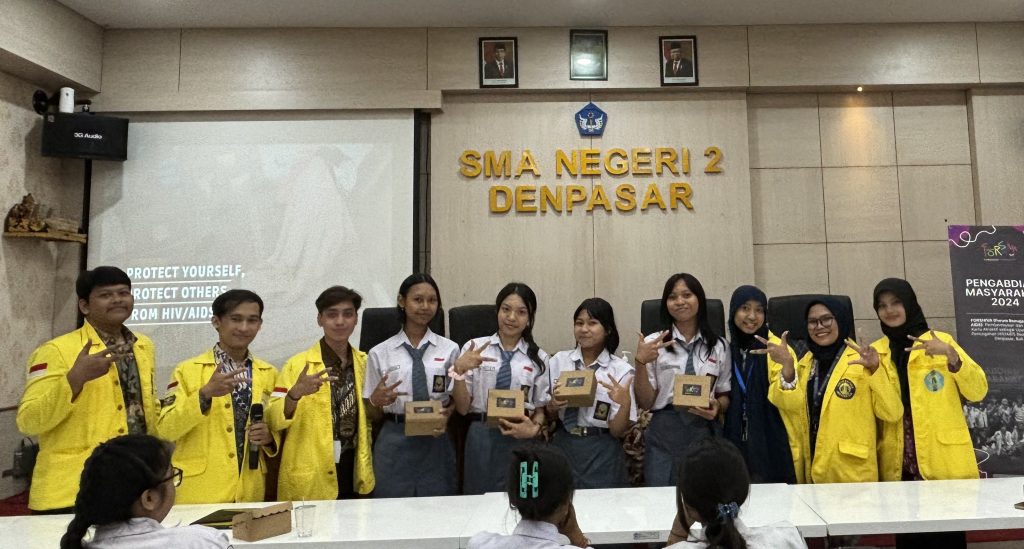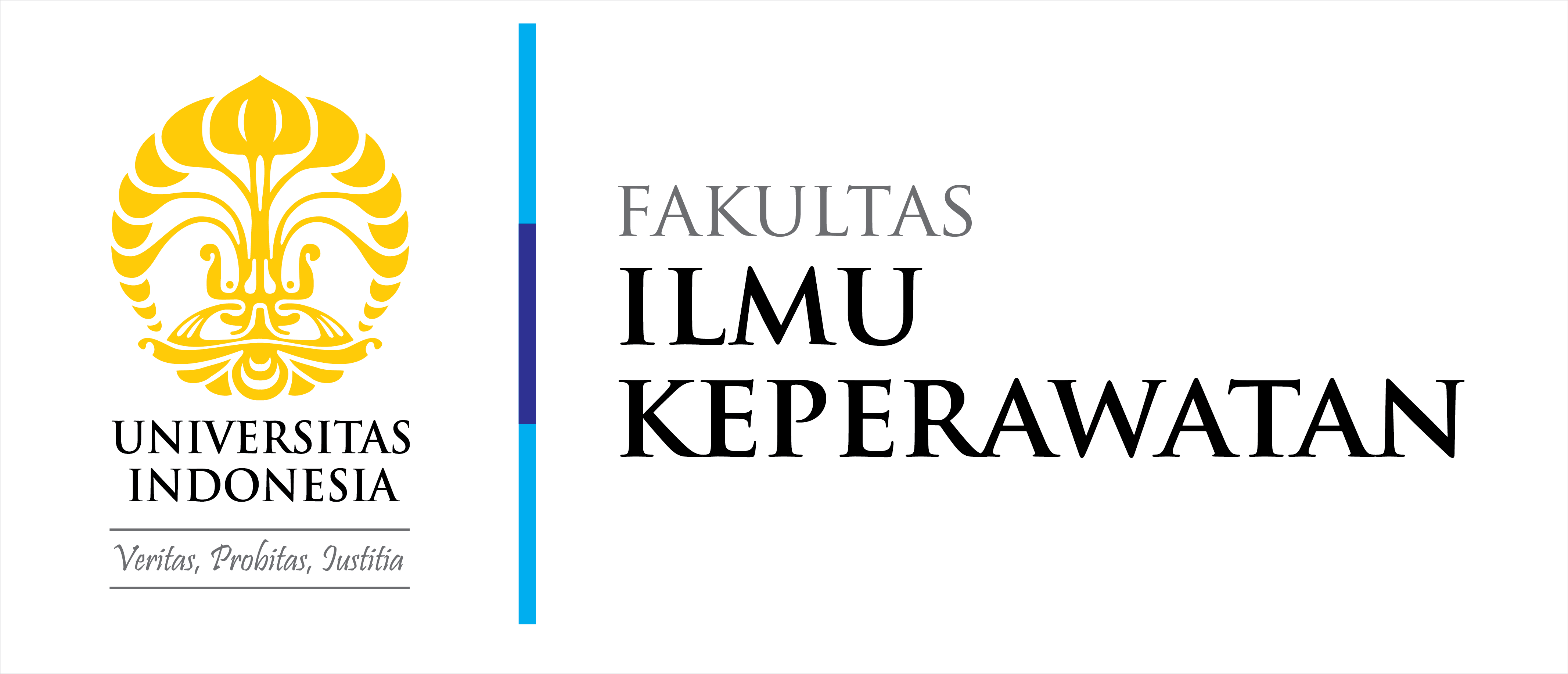
Adolescent health is a crucial issue in HIV/AIDS prevention efforts in Indonesia. The number of HIV/AIDS cases in Bali, especially in Denpasar City, shows the urgent need to increase awareness and understanding among adolescents. In this context, the Faculty of Nursing of the University of Indonesia (FoN UI) through Kamakara Community, took the initiative to hold an innovative educational program entitled “FORSHIVA (Forum Remaja Stop HIV/AIDS): Empowerment and Attractive Card Games as an Effort to Promote Adolescent HIV/AIDS Prevention”. This activity took place from July 18 to 25, 2024 at SMAN 2 Denpasar and aimed to provide appropriate and interesting information for adolescents about the dangers and ways to prevent HIV/AIDS.
Data from the Bali Provincial Health Office recorded 1,000 new HIV/AIDS cases by 2023, of which 20% are adolescents. This figure reflects the high vulnerability among adolescents, who are the next generation of the nation and the hope for the future. Limited knowledge about HIV/AIDS and the persistence of negative stigma in society make adolescents vulnerable to this disease. The dangers of HIV/AIDS are very serious, ranging from opportunistic infections that can attack an already weakened body, to long-term health complications that threaten life. In addition, PLWHA also face the risk of mental health problems due to stigma and discrimination.
Dean of FoN UI, Agus Setiawan, S.Kp., M.N., D.N., emphasized that, “Health education to adolescents is key to preventing the spread of HIV/AIDS. Through creative and interactive approaches, we hope to change the negative stigma and strengthen their understanding of reproductive health.”
FORSHIVA activities adopt a unique approach by utilizing attractive card games as educational media. This approach aims to create a fun and interactive atmosphere, so that teenagers are more open to receiving information. The Kamakara Community team, consisting of students from various faculties, designed educational materials that are comprehensive and in accordance with the needs of adolescents.
The activity started with an assessment at SMAN 2 Denpasar, where the team conducted interviews with the principal and vice principal to understand the needs and get support from the school. The distribution of information leaflets to students was also carried out, involving representatives from the extracurricular Student Group for AIDS and Drugs (KSPAN) and the Youth Red Cross (PMR). HIV/AIDS education began with an explanation session on what HIV and AIDS are, how they are transmitted, and the long-term health impacts. Through this session, students are expected to be able to distinguish between HIV and AIDS and understand the importance of prevention.
Risk factors for exposure to HIV/AIDS include unsafe sexual intercourse, injection drug use, and mother-to-child transmission. Raising awareness about these modes of transmission was an important part of the education provided. The team also provided training on how to resist promiscuous sexual behavior by using assertive communication techniques, which is especially important among adolescents who are searching for their identity.
FORSHIVA's attractive card game sessions were a core part of the program. The game was designed to convey important information about HIV/AIDS in a fun way. Participants are invited to actively participate, learning while playing, so that the knowledge gained can be better remembered. The cards not only contain basic information, but also address the myths that often surround the disease, helping to reduce the stigma that exists in the community. During the activity, participants were encouraged to interact and share their experiences, and results from the program evaluation showed a 13% increase in knowledge about HIV/AIDS among participants.
In terms of treatment, HIV cannot be cured, but can be managed with antiretroviral therapy (ART), which helps reduce viral load and improve immune system function. PLHIV need to undergo regular check-ups to monitor their health, and receive holistic social support to deal with stigma. One of the participants, Viola, revealed, “I just learned many things about HIV/AIDS after participating in this activity. Before, I thought HIV was only transmitted through sexual intercourse, but it turns out there are many other ways to be aware of. HIV/AIDS education is important because it is the first step of HIV/AIDS prevention.”
The program was not only successful thanks to the hard work of the Kamakara Community team, but also the support of various parties, including the Health Office and non-government agencies. This collaboration allowed for the development of better materials and the delivery of more comprehensive information. Support from the school, particularly SMAN 2 Denpasar, was also crucial in ensuring active student participation. To ensure the sustainability of the program, several strategic measures were developed. Program alumni will be involved as mentors for new students, as well as the integration of educational materials into the extracurricular curriculum at school.
Through the FORSHIVA program, FoN UI and Kamakara Community have taken a significant step in raising the awareness of Balinese youth about HIV/AIDS. By educating and empowering them, the program is expected to create a healthier young generation, aware of the importance of reproductive health, and brave enough to face the stigma. The success of this program is a clear example that with the right approach, information can be delivered in an interesting way and have a positive impact on the community.

Gedung A Lantai 2, Rumpun Ilmu Kesehatan (RIK), Kampus UI Depok,
Jl. Prof. Dr. Bahder Djohan, Kampus UI Depok, Pondok Cina, Kecamatan Beji, Kota Depok, Jawa Barat 16424, Indonesia.
Jl. Prof. DR. Sudjono D. Pusponegoro, Kampus UI Depok, Pondok Cina, Kecamatan Beji, Kota Depok,
Jawa Barat 16424, Indonesia.